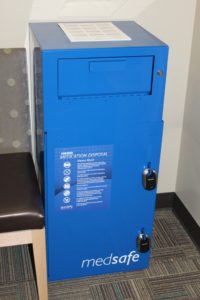Poison Prevention during the COVID-19 Pandemic

Social distancing presents challenges beyond decreased access to basic needs and services. Disruptions to daily routines, isolation and anxiety around circumstances can lead to poisoning, both accidental and intentional.
Children are naturally curious and like to mimic the adults in their lives. Because of this, it is important to:
- Teach children to ask before touching or tasting anything they find on their own.
- Purchase medication in child-resistant packaging whenever possible.
- Never refer to medicine as “candy” or another appealing name.
- When taking medication, remember to be out of the sight of children.
- Read all labels closely and take only as recommended.
Unused medications can be abused by family members creating an unnecessary risk. Medications not properly disposed of are often trashed or flushed, both having negative effects on the environment, animals, and people downstream.
Nebraska Medicine’s three outpatient pharmacies (DOC, Bellevue, and University Health Center in Lincoln) offer a free drop-off site for unneeded, unwanted, or expired medications. Any medication, including controlled substances/those in liquid form, can be dropped into the box. It’s a service to our patients, colleagues, and students to provide a way to properly and safely dispose of medications. Community locations can be found here.
Many people are focusing on cleaning in their homes. Remember these safety tips:
- Do NOT mix cleaning products together. Mixing bleach with an acid (like vinegar), some toilet bowl cleaners, or ammonia will result in a highly toxic chlorine/chloramine gas.
- Store household chemicals, and all cleaning products, in their original container.
- Always use in a well-ventilated area.
- Wear gloves to avoid skin contact.
- Follow label directions.
If soap and water is not available, hand sanitizers may help decrease unwanted germs on hands. Children are attracted to hand sanitizers because packaging may be in brightly colored bottles and smell like candy or food. These products usually contain > 60% ethyl alcohol which could cause alcohol poisoning. Some of the “homemade” sanitizers may not have labeling of ingredients and could pose a danger with exposure in mouth or eyes. Tips to keep in mind:
- Always supervise children when using hand sanitizer.
- Only use a dime-sized amount and rub in skin until dry.
- Avoid eye exposure.
- Keep out of reach and sight.
If you or a family member has ____ call the Nebraska Regional Poison Center, 1-800-222-1222—a free community service to the public available 24/7/365. You will speak immediately to a Registered Nurse or Pharmacist.
